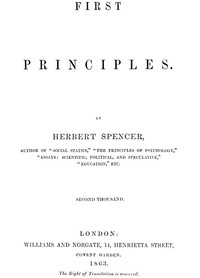First Principles by Herbert Spencer
"First Principles" by Herbert Spencer is a philosophical treatise written in the mid-19th century. The work is part of a larger series that aims to establish a systematic understanding of philosophy grounded in science, religion, and human experience. It explores the interplay between religion and science, seeking to reconcile their seemingly opposing views on existence and knowledge, and discusses the underlying truths present across various belief systems. The opening of the treatise
introduces the ambitious scope of Spencer’s work, as he presents a framework for his philosophical inquiry. He begins with a discussion on the nature of human beliefs, suggesting that even widely-held misconceptions may contain elements of truth. By analyzing the historical perspectives on authority and governance, Spencer underscores the evolution of political thought from divine kingship to modern democratic ideals. He proposes that there is a common thread among all religions and philosophies — the acknowledgment of fundamental truths concerning existence that are often obscured by dogma. Thus, the groundwork is laid for his exploration of "the unknowable" and the "laws of the knowable," setting the stage for a deeper analysis of both the limitations and possibilities of human understanding. (This is an automatically generated summary.)
Read or download for free
| Reading Options | Url | Size | |||
|---|---|---|---|---|---|
| Read now! | https://www.gutenberg.org/ebooks/55046.html.images | 1.1 MB | |||
| EPUB3 (E-readers incl. Send-to-Kindle) | https://www.gutenberg.org/ebooks/55046.epub3.images | 429 kB | |||
| EPUB (older E-readers) | https://www.gutenberg.org/ebooks/55046.epub.images | 440 kB | |||
| Kindle | https://www.gutenberg.org/ebooks/55046.kf8.images | 699 kB | |||
| older Kindles | https://www.gutenberg.org/ebooks/55046.kindle.images | 633 kB | |||
| Plain Text UTF-8 | https://www.gutenberg.org/ebooks/55046.txt.utf-8 | 1.0 MB | |||
| Download HTML (zip) | https://www.gutenberg.org/cache/epub/55046/pg55046-h.zip | 398 kB | |||
| There may be more files related to this item. | |||||
Similar Books
About this eBook
| Author | Spencer, Herbert, 1820-1903 |
|---|---|
| Title | First Principles |
| Credits |
Produced by Richard Tonsing and the Online Distributed Proofreading Team at www.pgdp.net (This file was produced from images generously made available by The Internet Archive) |
| Reading Level | Reading ease score: 40.1 (College-level). Difficult to read. |
| Language | English |
| LoC Class | B: Philosophy, Psychology, Religion |
| Subject | Philosophy and religion |
| Subject | Evolution |
| Subject | Knowledge, Theory of |
| Category | Text |
| EBook-No. | 55046 |
| Release Date | Jul 5, 2017 |
| Most Recently Updated | Oct 23, 2024 |
| Copyright Status | Public domain in the USA. |
| Downloads | 804 downloads in the last 30 days. |
| Project Gutenberg eBooks are always free! | |

